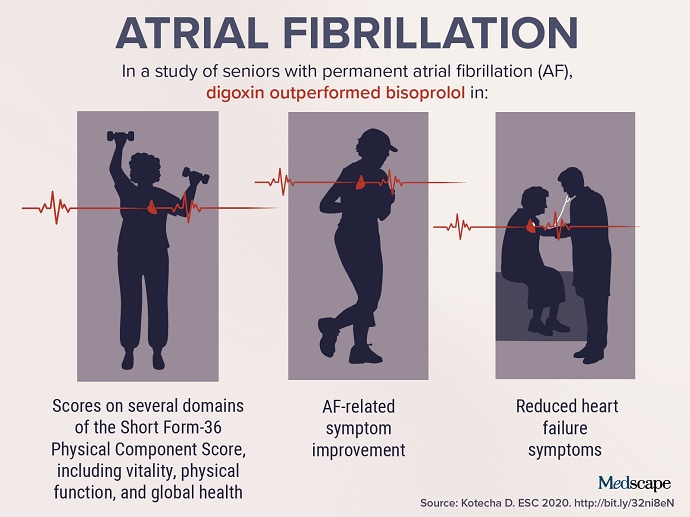Each week, we identify one top search term, speculate about what caused its popularity, and provide an infographic on a related condition. If you have thoughts about what's trending and why, share them with us on Twitter or Facebook.
New research and guidelines presented at the virtual European Society of Cardiology (ESC) Congress 2020 resulted in atrial fibrillation (AF) becoming this week's top trending clinical topic. Researchers behind the Rate Control Therapy Evaluation in Permanent Atrial Fibrillation (RATE-AF) trial argue that digoxin now deserves to be considered first-line treatment for long-term heart rate control in older patients with permanent AF and symptoms of heart failure. In the trial, 160 seniors (mean age, 76 years) with moderate or severe symptoms due to permanent AF as well as heart failure symptoms were randomly assigned to low-dose digoxin or the beta-blocker bisoprolol.
Digoxin and bisoprolol were similarly effective at reducing heart rate at 6 and 12 months. The two drugs also demonstrated little difference in their effect on patient-reported quality of life at 6 months, as reflected by their Short Form-36 Physical Component Score, the primary study endpoint. Both drugs were well tolerated, although digoxin demonstrated superiority in several assessments (see Infographic below). In his reaction to the surprising findings, John Mandrola, MD, called the findings "provocative." Although Mandrola concludes that the results strongly favor digoxin, he's cautious, concerned about the open-label nature of the trial and the external validity of RATE-AF findings in real-world practice.
A separate study presented at ESC and published simultaneously in The New England Journal of Medicine examined rhythm control using antiarrhythmic drugs and/or ablation in early, recently diagnosed AF. The large, randomized EAST-AFNET 4 trial found that intervention decreased risk for major adverse cardiovascular outcomes, compared with a rate-control strategy, during more than 5 years of follow-up. This is in contrast to previous trials of rate vs rhythm control in AF, such as the Atrial Fibrillation Follow-up Investigation of Rhythm Management (AFFIRM) trial. Researchers suggest that the results may have differed because EAST-AFNET 4 incorporated AF ablation and because treatment started soon after diagnosis of the arrhythmia.
In his response to the EAST-AFNET 4 results, Mandrola points to concerns about the internal validity of data, including missing data and bias-sensitive endpoints. However, Mandrola ultimately concludes that "EAST-AFNET 4 shows that an early rhythm-control strategy, used in the setting of a clinical trial, in selected expert centers, with good adherence to background therapy, may improve outcomes compared with a strategy of rate control."
New guidelines for AF were also revealed at this year's ESC Congress. The ESC guidelines were developed in collaboration with the European Association for Cardio-Thoracic Surgery and published simultaneously on August 29 in the European Heart Journal. The recommendations support opportunistic screening for AF by pulse-taking or ECG rhythm strip in patients at least 65 years of age. They also suggest that systematic ECG screening should be considered to detect AF in individuals at least 75 years of age or in those at high risk for stroke. New class I screening recommendations in 2020 include informing individuals undergoing screening about the significance and treatment implications of detecting AF, and having a structured referral platform in place for further physician-led evaluation.
As the incidence of AF is expected to rise, news about early interventions and guidelines for screening and treatment were met with great interest, resulting in this week's top trending clinical topic.
Medscape © 2020 WebMD, LLC
Any views expressed above are the author's own and do not necessarily reflect the views of WebMD or Medscape.
Cite this: Ryan Syrek. Trending Clinical Topic: Atrial Fibrillation - Medscape - Sep 11, 2020.





Comments